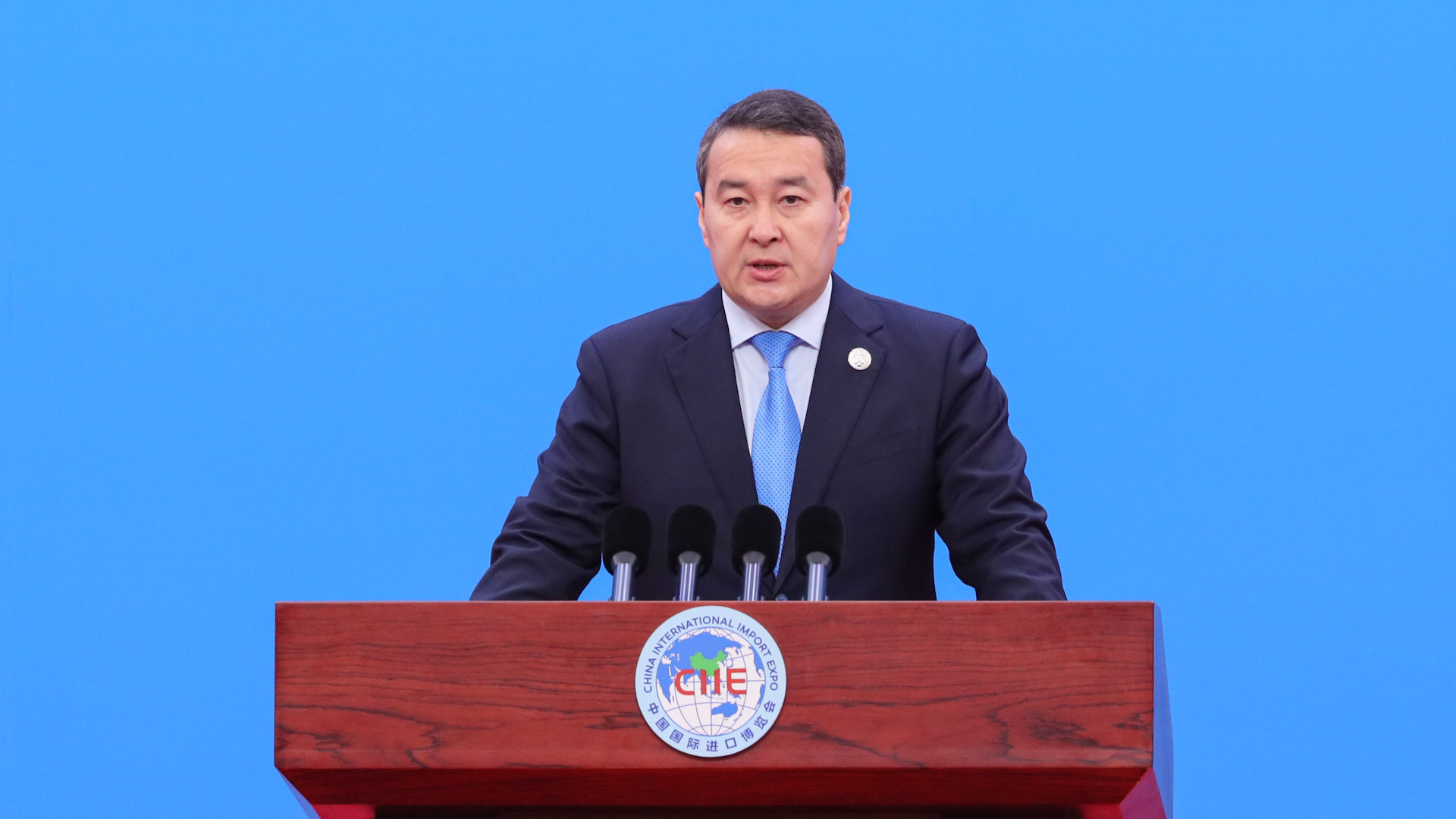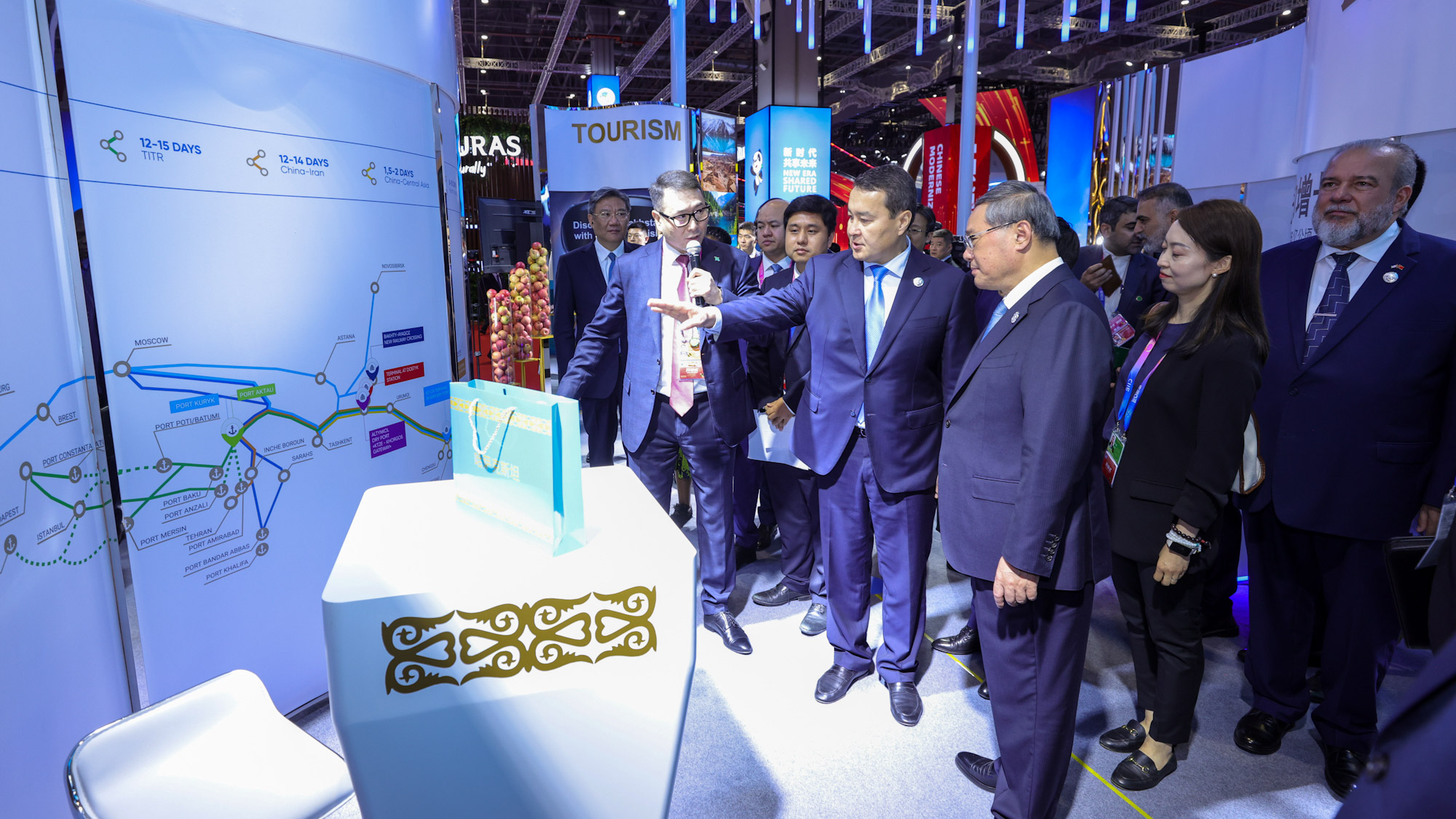ASTANA – Kazakh Prime Minister Alikhan Smailov outlined key aspects of Kazakh-Chinese cooperation during the 6th China International Import Expo (CIIE) in Shanghai on Nov.5, reported the Prime Minister’s press service.

Smailov expressed confidence in the future growth of product volumes produced by joint ventures between Kazakhstan and China, inviting interested Chinese companies to collaborate. Photo credit: primeminister.kz.
Economic Growth Prospects and Opportunities in Sino-Kazakh Collaboration
“Kazakhstan’s participation in CIIE coincides with a new phase in the development of Kazakhstan-China cooperation. In the next 30-year cycle, the interaction between our countries in terms of economic cooperation will play a significant role. In this regard, we see tremendous opportunities,” said Smailov, expressing confidence in the future growth of product volumes produced by joint ventures between Kazakhstan and China and inviting interested Chinese companies to collaborate.

The Prime Minister and delegation heads from participating countries in the 6th China International Import Expo toured the Kazakh national pavilions on Nov.5. Photo credit: primeminister.kz.
“The Kazakh government stands ready to provide the necessary support and create favorable conditions for joint work,” he said.
Smailov underscored the significance of consolidated efforts, especially amid geopolitical tensions worldwide, to achieve sustainable economic development. Like many other nations, Kazakhstan grapples with the consequences of global economic challenges, including trade impediments, disruptions in manufacturing networks, and financial instability.
“We are ready to collaborate with our partners in developing and implementing practical mechanisms to enhance economic cooperation, capable of minimizing the impact of global threats in the future,” said Smailov.
He emphasized the importance of further advancing trade and cross-border e-commerce. Over the past decade, the total trade volume between China and the countries along the Belt and Road Initiative reached $19.5 trillion, with a combined investment volume of $380 billion. Trade between China and the Central Asian region has significantly increased, hitting $70 billion in the previous year, and Kazakhstan contributed 45% to this total. The Prime Minister emphasized that countries can easily sustain this momentum and increase trade turnover to $100 billion by 2030.
Importance of Transport and Logistics Cooperation
According to Smailov, it is crucial to expand exports by broadening the range of tradable goods and streamlining administrative procedures, including digitalization processes. He stressed that Kazakhstan aims to enhance the use of mutual electronic platforms and jointly promote products across the entire Eurasian region.
“We have successful cases in this area, including collaboration with the Alibaba Group. In May this year, Kazakhstan’s National Pavilion was launched on the JD.com platform. To optimize logistics on a mutually beneficial basis, we are prepared to support the construction of bonded warehouses in Kazakhstan,” he noted.
Ensuring food security is another critical focus for Kazakhstan, being among the world’s top ten producers of wheat and flour. The country consistently exports environmentally clean oilseeds, grain, meat, and other products to China.
“Kazakhstan is ready to implement specific projects in the agricultural sector, strengthen regional food security, and adopt food development programs,” emphasized Smailov.
In the current geopolitical landscape, expanding trade necessitates innovative approaches. Therefore, developing transport and logistics cooperation is essential. Kazakhstan, with its strategic regional transport and logistics hubs, serves as a crucial link connecting the Eurasian continent with the Asia-Pacific region. Smailov noted that nearly 85% of all overland transit shipments from China to Europe pass through Kazakhstan.
He highlighted Kazakhstan’s collaboration with China on significant infrastructure projects, including the Western Europe – Western China international highway corridor, a logistics center in the Lianyungang port, the international border trade center in Khorgos, a joint dry port in the Khorgos – Eastern Gate zone, and China – Kazakhstan – Turkmenistan – Iran railway corridor.
“To further boost container shipments along the China-Europe route, we propose more active utilization of the Trans-Caspian International Transport Route. This will significantly reduce the transportation time for goods,” said the Prime Minister.
He also mentioned the construction of Kazakhstan’s terminals in Xi’an and the Georgian port of Poti. Plans include the construction of a third railway border checkpoint at the Kazakhstan-China border, “dry ports” at the Bakhty and Kalzhat crossings, a container hub in Aktau, and expanding port capacities along the Black Sea along the Middle Corridor.
“We invite Chinese transport companies to participate in these projects and urge transport and logistics operators to utilize the existing cross-border transport infrastructure in Kazakhstan,” said Smailov.
Showcasing Kazakh Opportunities at CIIE
The Prime Minister and delegation heads from participating countries in the CIIE toured the Kazakh national pavilions the same day. The pavilion showcased Kazakhstan’s investment, trade, and industrial opportunities in agriculture, tourism, logistics, exports, and innovations.
“Today, Kazakhstan and China signed 21 protocols for exporting Kazakh agricultural and food products, significantly increasing the supply of agricultural products to China. Kazakhstan can expand the export of environmentally clean agricultural products to the Chinese market. The export potential for vegetable oils and meal alone sums up $300 million,” said Arman Shakkaliyev, the Minister of Trade and Integration.
He also highlighted substantial opportunities for Kazakh livestock producers, particularly in the export of beef, mutton, and poultry meat.
Over 30 Kazakh enterprises participated in the exhibition, including producers of food, flour, dairy, alcoholic products, confectionery, pasta products, honey, salt, and combined additives for livestock, among others.
Eurasia Invest, a regular exhibitor for six years, showcased products like dried camel and mare’s milk. Meruert Rakhimberdiyeva, a company representative, noted that the Expo had helped them find partners in China.
“Camel milk is quite successful in China. Chinese consumers have high-quality standards for products. German drying technology allows us to preserve all the beneficial properties of the milk and ensure product quality,” she said.
Over the past five years, 133 companies from Kazakhstan have participated in the CIIE, leading to profitable export contracts totaling over $260 million.

